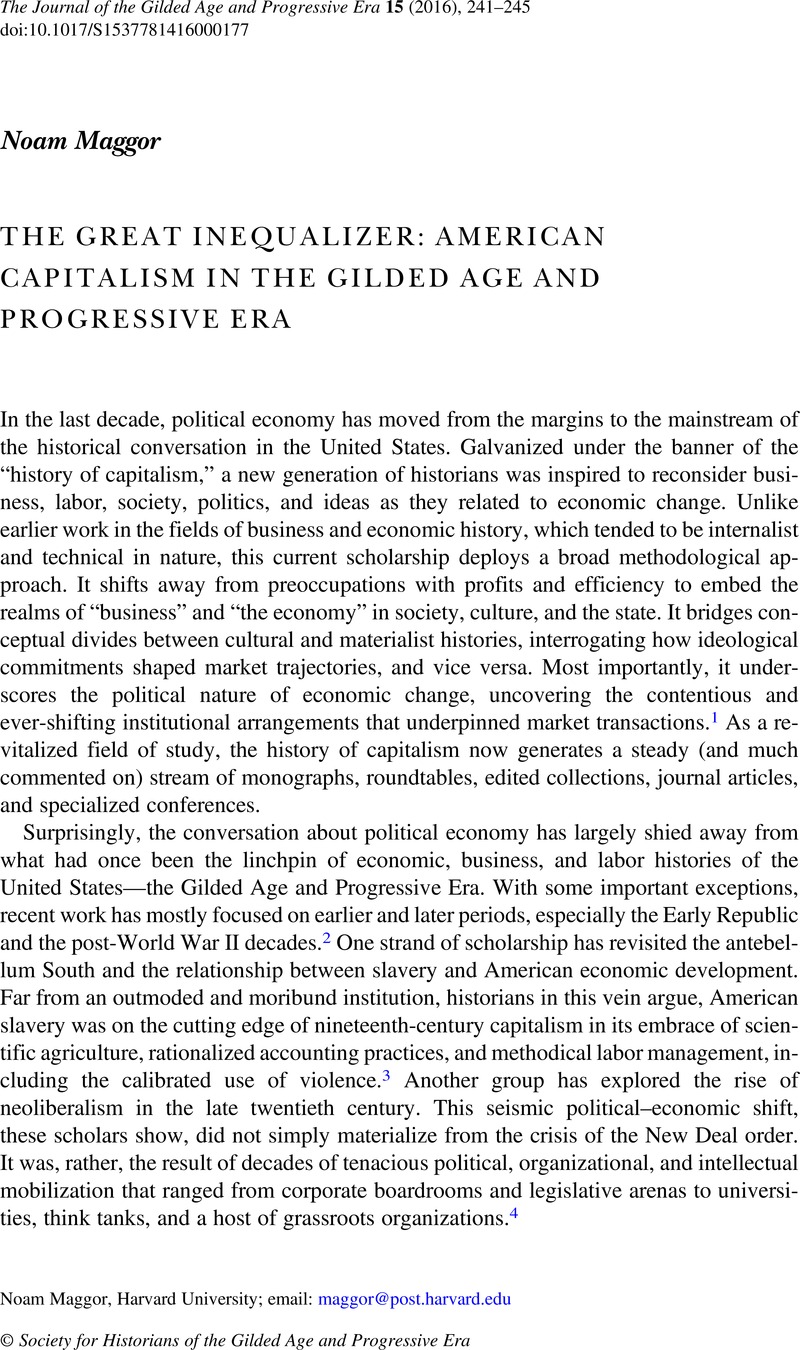Article contents
THE GREAT INEQUALIZER: AMERICAN CAPITALISM IN THE GILDED AGE AND PROGRESSIVE ERA
Published online by Cambridge University Press: 27 July 2016
Abstract

- Type
- Special Issue: The History of Capitalism in the Gilded Age and Progressive Era
- Information
- Copyright
- Copyright © Society for Historians of the Gilded Age and Progressive Era 2016
References
NOTES
1 Sven Beckert, “History of American Capitalism” in American History Now, eds. Eric Foner and Lisa McGirr (Philadelphia: Temple University Press, 2011); Michael Zakim and Gary J. Kornblith, eds., Capitalism Takes Command: The Social Transformation of Nineteenth-Century America (Chicago: University of Chicago Press, 2011); Sklansky, Jeffrey, “Labor, Money, and the Financial Turn in the History of Capitalism,” Labor 11:1 (2014): 23CrossRefGoogle Scholar; Sklansky, Jeffrey, “The Elusive Sovereign: New Intellectual and Social Histories of Capitalism,” Modern Intellectual History 9:1 (2012): 233–48CrossRefGoogle Scholar; Sewell, William H., “A Strange Career: The Historical Study of Economic Life,” History and Theory 49:4 (Dec. 1, 2010): 146–66CrossRefGoogle Scholar; “Interchange: The History of Capitalism,” Journal of American History 101:2 (2014): 503–36CrossRefGoogle Scholar; Smith, Jason Scott, “A Reintroduction to Political Economy: History, Institutions, and Power,” Journal of Interdisciplinary History 36:1 (2005): 63–71 CrossRefGoogle Scholar; John, Richard R., “Farewell to the ‘Party Period’: Political Economy in Nineteenth-Century America,” Journal of Policy History 16:2 (2004): 117–25CrossRefGoogle Scholar. It is the conscious effort to politicize the history of economic life that sets the history of capitalism apart from the fields of business and economic history, including the truly groundbreaking work in these fields; see Lipartito, Kenneth, “Reassembling the Economic: New Departures in Historical Materialism,” American Historical Review 121:1 (2016): 101–39CrossRefGoogle Scholar; Lipartito, Kenneth, “Connecting the Cultural and the Material in Business History,” Enterprise & Society 14:4 (2013): 686–704 CrossRefGoogle Scholar; Philip Scranton and Patrick Fridenson, Reimagining Business History (Baltimore: Johns Hopkins University Press, 2013).
2 Most notably Jonathan Levy, Freaks of Fortune: The Emerging World of Capitalism and Risk in America (Cambridge, MA: Harvard University Press, 2012); Richard White, Railroaded: The Transcontinentals and the Making of Modern America (New York: W. W. Norton & Company, 2011).
3 Sven Beckert and Seth Rockman, eds., Slavery's Capitalism: A New History of American Economic Development (Philadelphia: University of Pennsylvania Press, 2016); Sven Beckert, Empire of Cotton: A Global History (New York: Knopf, 2014); Edward E. Baptist, The Half Has Never Been Told: Slavery and the Making of American Capitalism (New York: Basic Books, 2014); Walter Johnson, River of Dark Dreams: Slavery and Empire in the Cotton Kingdom (Cambridge, MA: Harvard University Press, 2013); Adam Rothman, Slave Country: American Expansion and the Origins of the Deep South (Cambridge, MA: Harvard University Press, 2005); Joshua D. Rothman, Flush Times and Fever Dreams: A Story of Capitalism and Slavery in the Age of Jackson (Athens: University of Georgia Press, 2012); Caitlin Clare Rosenthal, “From Memory to Mastery: Accounting for Control in America, 1750–1880.” (PhD diss., Harvard University, 2012).
4 Bethany Moreton, To Serve God and Wal-Mart: The Making of Christian Free Enterprise (Cambridge, MA: Harvard University Press, 2009); Julia C. Ott, When Wall Street Met Main Street: The Quest for an Investors' Democracy (Cambridge, MA: Harvard University Press, 2011); Louis Hyman, Debtor Nation: The History of America in Red Ink (Princeton, NJ: Princeton University Press, 2011); Shane Hamilton, Trucking Country: The Road to America's Wal-Mart Economy (Princeton, NJ: Princeton University Press, 2008); Benjamin C. Waterhouse, Lobbying America: The Politics of Business in the New Economic Order, 1970–1990 (Princeton, NJ: Princeton University Press, 2014); Angus Burgin, The Great Persuasion: Reinventing Free Markets since the Depression (Cambridge, MA: Harvard University Press, 2012); Kim Phillips-Fein, Invisible Hands: The Making of the Conservative Movement from the New Deal to Reagan (New York: W. W. Norton & Company, 2009); Kim Phillips-Fein and Julian E. Zelizer., eds., What's Good for Business: Business and American Politics since World War II (Oxford: Oxford University Press, 2012).
5 Alfred D. Chandler, The Visible Hand: The Managerial Revolution in American Business (Cambridge, MA: Belknap Press of Harvard University Press, 1977); Robert H. Wiebe, The Search for Order, 1877–1920 (New York: Hill and Wang, 1967); Alan Trachtenberg, The Incorporation of America: Culture and Society in the Gilded Age, American Century Series (New York: Hill and Wang, 1982); William Cronon, Nature's Metropolis: Chicago and the Great West (New York: W.W. Norton, 1991).
6 For an old critique along these lines, see Martin J. Sklar, The Corporate Reconstruction of American Capitalism, 1890–1916: The Market, the Law, and Politics (Cambridge: Cambridge University Press, 1988), 117–25. See also Livingston, James, “The Social Analysis of Economic History and Theory: Conjectures on Late Nineteenth-Century American Development,” The American Historical Review 92:11 (1987): 69–95 CrossRefGoogle Scholar; James Livingston, Origins of the Federal Reserve System: Money, Class, and Corporate Capitalism, 1890–1913 (Ithaca, NY: Cornell University Press, 1986); Gerald Berk, Alternative Tracks: The Constitution of American Industrial Order, 1865–1917 (Baltimore: Johns Hopkins University Press, 1994); Berk, Gerald, “Corporate Liberalism Reconsidered: A Review Essay,” Journal of Policy History 3:1 (1991): 70CrossRefGoogle Scholar.
7 On the pitfalls of this, see John, Richard R., “Who Were the Gilders? And Other Seldom-Asked Questions about Business, Technology, and Political Economy in the United States, 1877–1900,” The Journal of the Gilded Age and Progressive Era 8:4 (Oct. 2009): 474–80CrossRefGoogle Scholar.
8 The relevance of these issues is underscored in Thomas Piketty, Capital in the Twenty-First Century, trans. Arthur Goldhammer (Cambridge, MA: Harvard University Press, 2014).
9 Daniel T. Rodgers, Age of Fracture (Cambridge, MA: Belknap Press of Harvard University Press, 2012), 100.
- 2
- Cited by


